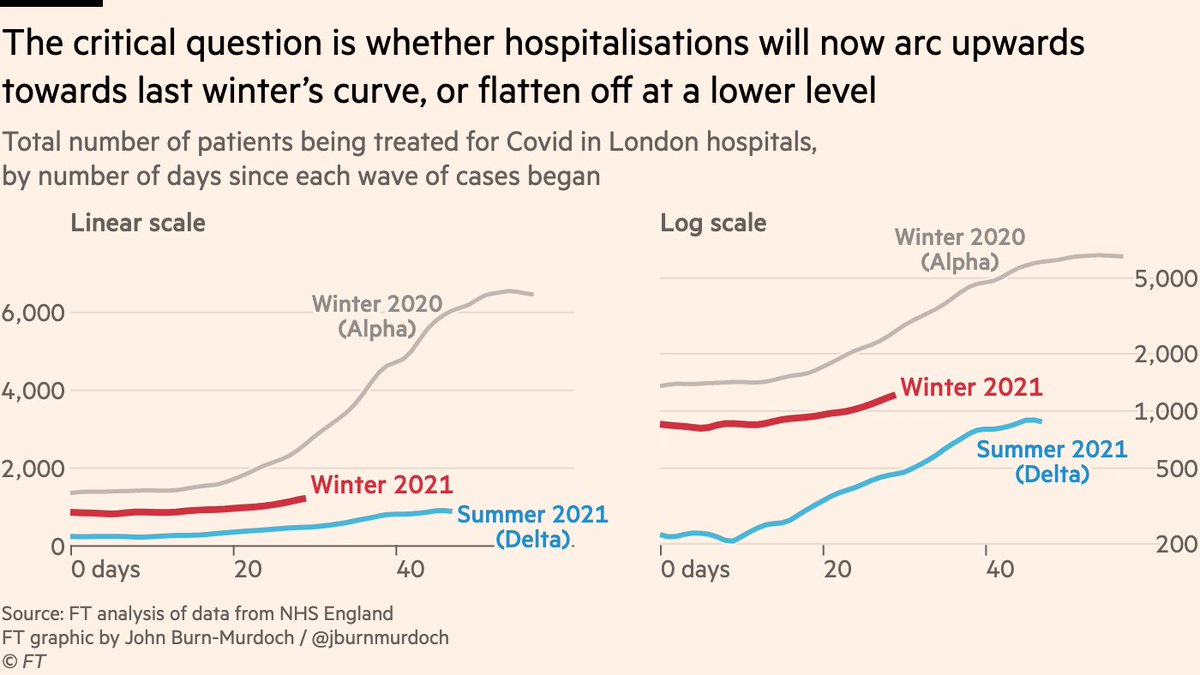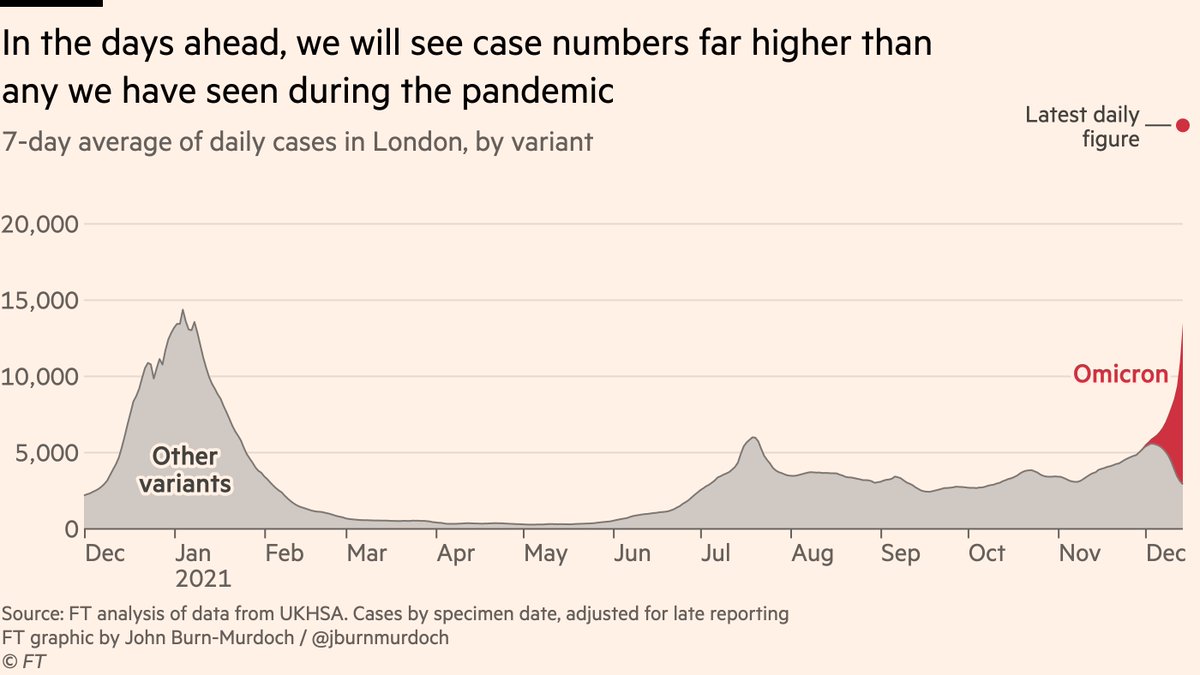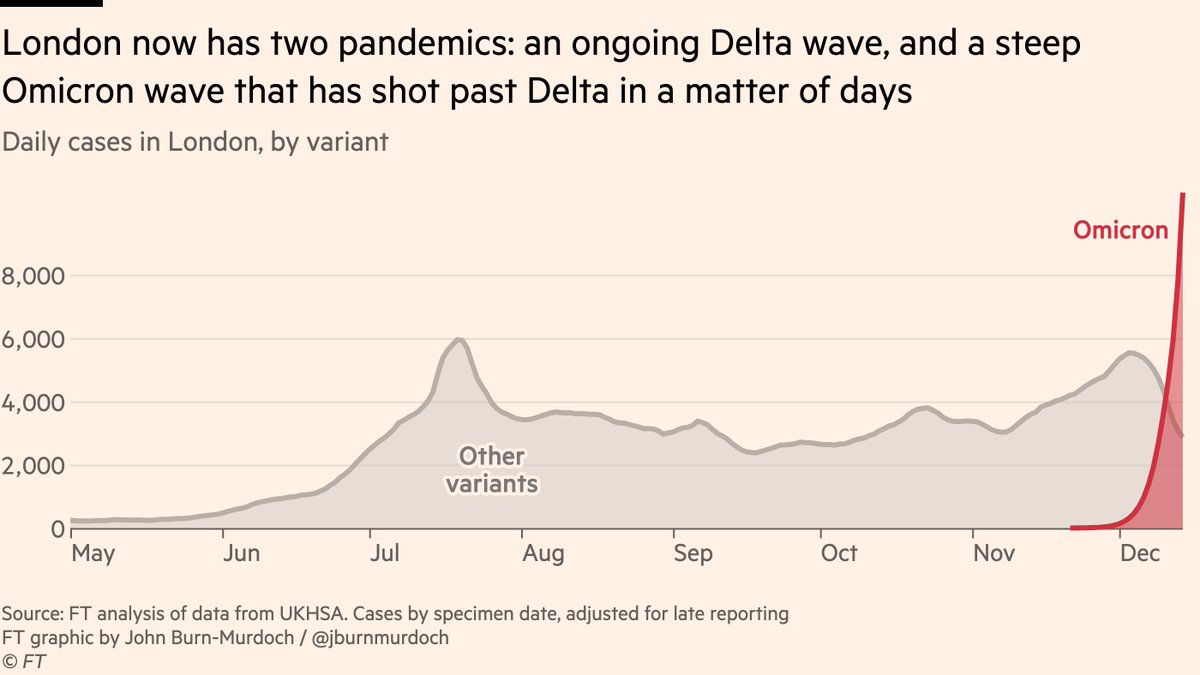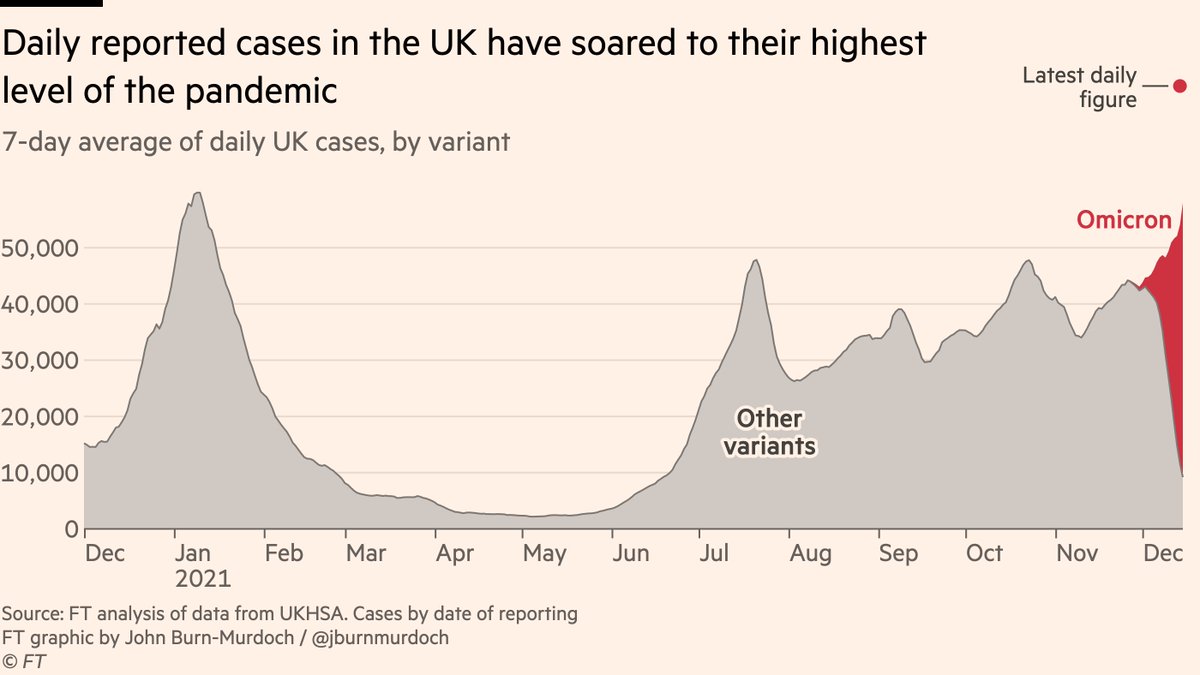
Thread summarising all of today’s Omicron severity data:
Story from me, @mroliverbarnes and @rmilneNordic, running through new data from South Africa, Denmark, England & Scotland ft.com/content/19065f…
Top-line: share of Omicron cases requiring hospital is lower than for Delta
Story from me, @mroliverbarnes and @rmilneNordic, running through new data from South Africa, Denmark, England & Scotland ft.com/content/19065f…
Top-line: share of Omicron cases requiring hospital is lower than for Delta
Critical first caveat: this is *not* comparing Omicron now to Delta waves months ago.
This is comparing Omi vs Delta in the same populations, at the same time.
So we’re not just saying "Omicron appears less severe because loads of people got vaxxed/infected in recent months".
This is comparing Omi vs Delta in the same populations, at the same time.
So we’re not just saying "Omicron appears less severe because loads of people got vaxxed/infected in recent months".
So, what do the studies show?
In all four countries, the share of Omicron cases that require hospitalisation is lower than the share of Delta cases, after adjusting for age, sex, underlying health conditions etc (but not adjusting for vax/infection: more on this in a sec)
In all four countries, the share of Omicron cases that require hospitalisation is lower than the share of Delta cases, after adjusting for age, sex, underlying health conditions etc (but not adjusting for vax/infection: more on this in a sec)

That last point matters, a lot, because although there are some limited signs of intrinsic lower severity of Omicron, what all the papers agree on is that a key reason for the observed mildness of Omicron is that...
*Omicron cases are much more likely to be breakthroughs/reinfections than Delta cases, i.e the average Omicron case today has more protection against severe disease than the average Delta case today* 

Why is this?
Well, as @nataliexdean illustrated here, Omicron’s ability evade our outer immune defences means that while both variants are very good at infecting the unprotected, Omicron is better than Delta at infecting the protected
Well, as @nataliexdean illustrated here, Omicron’s ability evade our outer immune defences means that while both variants are very good at infecting the unprotected, Omicron is better than Delta at infecting the protected
https://twitter.com/nataliexdean/status/1468988174693289994
So even if Omicron turns out to be no less intrinsically virulent than Delta, this compositional effect on each variant’s cases means we can expect to see the case-hospitalisation-rate fall in all Omicron waves.
On top of that, it remains possible Omicron may prove intrinsically less severe
The Scottish study found that after adjusting for vaccination status, there was still a marked reduction in the share of Omicron cases requiring hospitalisation relative to Delta over the same period
The Scottish study found that after adjusting for vaccination status, there was still a marked reduction in the share of Omicron cases requiring hospitalisation relative to Delta over the same period
(Though a tricky issue here is that since most prior infections are missed, the inability to properly control for past infection means some of what we see as "intrinsic mildness" is due to Omicron infecting lots of people with immunity via past infection that we don’t know about)
The raw, unadjusted Scottish hospital data really is quite something...
https://twitter.com/PaulMainwood/status/1473719984668950533
So, where does this all leave us?
Well, whether solely through its higher number of partially-immune cases, or through something intrinsic (?), we can be confident that the share of cases progressing to severe disease and hospital will fall as Omicron takes hold.
Well, whether solely through its higher number of partially-immune cases, or through something intrinsic (?), we can be confident that the share of cases progressing to severe disease and hospital will fall as Omicron takes hold.
And what’s happening on the ground?
Well, here’s the latest from London:
Covid-positive patient numbers are rising steeply. This is concerning, but with incidental admissions (with, not for, Covid) a known issue with Omicron, we can’t yet be sure how much of that rise is which.
Well, here’s the latest from London:
Covid-positive patient numbers are rising steeply. This is concerning, but with incidental admissions (with, not for, Covid) a known issue with Omicron, we can’t yet be sure how much of that rise is which.

The good news is we’ll find out tomorrow, when the weekly dataset breaking down Covid patients by primary diagnosis is published.
Last week it showed a marked rise in incidental admissions that we had not seen when Delta took off.
Last week it showed a marked rise in incidental admissions that we had not seen when Delta took off.

(obligatory note here that even if Covid is only an incidental finding in patient, it still creates additional pressure on hospitals, because Covid patients have to be in Covid wards, which takes away capacity from other patients) 

Another promising sign is that growth rate in London cases has been slowing steadily in recent days (right hand chart)
This could be for many reasons, but having looked at the testing data, my prior is that it’s mainly the marked decline in social mixing
This could be for many reasons, but having looked at the testing data, my prior is that it’s mainly the marked decline in social mixing
https://twitter.com/BristOliver/status/1473685604852547601
Final caveats:
• The studies here are still using pretty early data. Numbers for reduced case-hospitalisation-rate will almost certainly change as more data comes in
• Cases and admissions can do weird things around Christmas, so we should be wary of over-interpreting patterns
• The studies here are still using pretty early data. Numbers for reduced case-hospitalisation-rate will almost certainly change as more data comes in
• Cases and admissions can do weird things around Christmas, so we should be wary of over-interpreting patterns
And now links to all the papers:
• South Africa medrxiv.org/content/10.110…
• Danish data: files.ssi.dk/covid19/omikro…
• England imperial.ac.uk/media/imperial…
• Scotland pure.ed.ac.uk/ws/portalfiles…
• South Africa medrxiv.org/content/10.110…
• Danish data: files.ssi.dk/covid19/omikro…
• England imperial.ac.uk/media/imperial…
• Scotland pure.ed.ac.uk/ws/portalfiles…
And a footnote: I agree with Andrew here that the Imperial paper today was by far the hardest to decipher, which for an issue as important as this is ... less than ideal
https://twitter.com/andrew_lilico/status/1473755303682392080
Addendum: great accessible thread here from @dgurdasani1 unpicking precisely what the Imperial paper tells us, including its demonstration of the significance of the fact that Omicron is much likely to cause reinfections
https://twitter.com/dgurdasani1/status/1473764701553283076
Another addition. Excellent @_nickdavies thread explains:
• LSHTM models which predict at least half as many admissions this winter as last already assumed lower case-hospitalisation rate for Omi
• Key part is we expect Omi cases to end up skewing older
• LSHTM models which predict at least half as many admissions this winter as last already assumed lower case-hospitalisation rate for Omi
https://twitter.com/_nickdavies/status/1473941671196905478
• Key part is we expect Omi cases to end up skewing older
• • •
Missing some Tweet in this thread? You can try to
force a refresh













